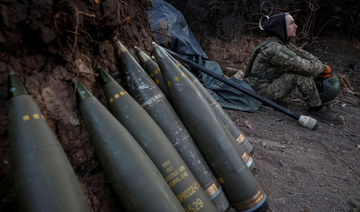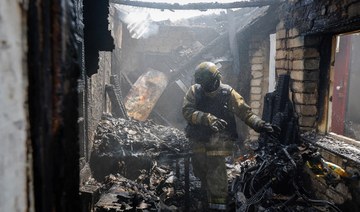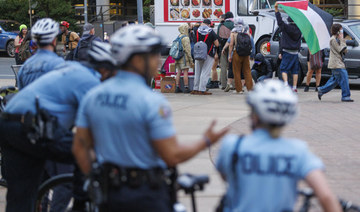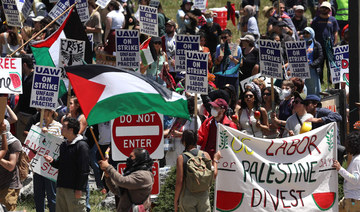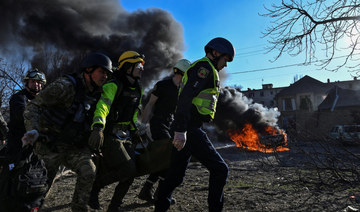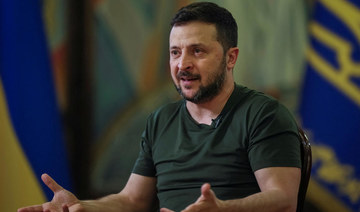LONDON: The British government appointed a vaccines minister on Saturday as it prepares to inoculate millions of people against the coronavirus, potentially starting within days.
Prime Minister Boris Johnson said Conservative lawmaker Nadhim Zahawi will oversee the country’s biggest vaccine program in decades.
The UK medicines regulator is currently assessing two vaccines — one developed by Pfizer and BioNTech, the other by Oxford University and AstraZeneca — to see if they are safe and effective. The Guardian newspaper reported that hospitals have been told they could receive the first doses of the Pfizer shot the week of Dec. 7, if it receives approval.
The UK says frontline health care workers and nursing home residents will be the first to be vaccinated, followed by older people, starting with those over age 80.
Britain has ordered 40 million doses of the Pfizer/BioNTech vaccine, enough for 20 million people, and 100 million doses of the Oxford/AstraZeneca vaccine.
In all, the UK government has agreed to purchase up to 355 million doses of vaccine from seven different producers, as it prepares to vaccinate as many of the country’s 67 million people as possible.
Decisions about which, if any, vaccines to authorize will be made by the independent Medicines and Healthcare Products Regulatory Agency.
Pfizer and BioNTech say their vaccine is 95% effective, according to preliminary data. It must be stored at ultra-cold temperatures of around minus 70 degrees Celsius (minus 94 Fahrenheit).
The Oxford-AstraZeneca vaccine can be stored at conventional refrigerator temperatures, and is also cheaper than its main rivals. But some scientists have questioned gaps in its reported results.
Oxford and AstraZeneca reported this week that their vaccine appeared to be 62% effective in people who received two doses, and 90% effective when volunteers were given a half dose followed by a full dose. They said the half dose was administered because of a manufacturing error, and they plan a new clinical trial to investigate the most effective dosing regimen.
The British government hopes a combination of vaccines and mass testing will end the need for restrictions on business and everyday life it imposed to curb the spread of the coronavirus. Britain has had Europe’s deadliest COVID-19 outbreak, with more than 57,000 confirmed virus-related deaths.
The prime minister said this week that officials hope to inoculate “the vast majority of the people who need the most protection by Easter.” But he warned that “we must first navigate a hard winter” of restrictions.
A four-week national lockdown in England is due to end Wednesday, and will be replaced by three-tiered system of regional measures that restrict business activity, travel and socializing. The vast majority of the country is being put into the upper two tiers.
Johnson faces opposition to the measures from dozens of his own Conservative Party’s lawmakers, who say the economic damage outweighs the public health benefits.
Bur Cabinet minister Michael Gove said the restrictions were “grimly” necessary to avoid the health system being overwhelmed this winter.
Writing in The Times of London, Gove said there are currently 16,000 coronavirus patients in British hospitals, not far below the April peak of 20,000. A rise in infections would mean coronavirus patients would “displace all but emergency cases. And then even those.," he said.
“If, however, we can keep the level of infection stable or, even better, falling, and hold out through January and February, then we can be confident that vaccination will pull the plug on the problem,” Gove wrote.
UK PM names Nadhim Zahawi as minister responsible for vaccine deployment
https://arab.news/nnz4d
UK PM names Nadhim Zahawi as minister responsible for vaccine deployment
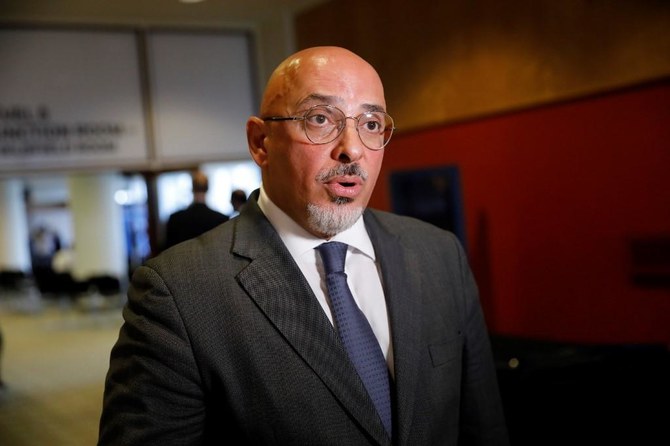
- Johnson said Conservative lawmaker Nadhim Zahawi will oversee the country’s biggest vaccine program in decades
- The UK medicines regulator is currently assessing two vaccines to see if they are safe and effective
Norway to block entry for most Russian tourists, Moscow says it will respond
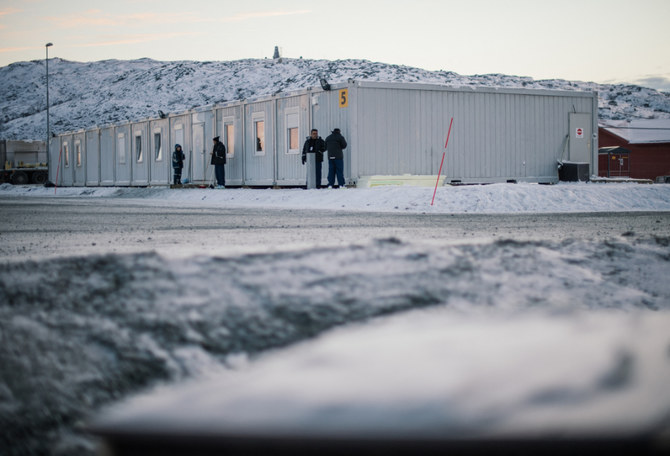
Norway will further curb access for Russian tourist travelers due to the ongoing war in Ukraine, blocking almost all entry from May 29, the Nordic country’s justice ministry said on Thursday.
Russia called the decision “purely discriminatory” and said it would respond.
Norway, a NATO member that shares a border with Russia in the Arctic measuring almost 200 km (124 miles), first imposed restrictions on Russian tourist visas in 2022, shortly after Russia began a full-scale invasion of Ukraine.
“The decision to tighten the entry rules is in line with the Norwegian approach of standing by allies and partners in reaction to Russia’s illegal war of aggression against Ukraine,” Justice Minister Emilie Enger Mehl said in a statement.
Any Russian citizens whose purpose is tourism and other non-essential travel will be turned back at the border. Exceptions may be granted in cases such as visits to close family residing in Norway, the ministry said in a statement.
“The change implies that the police can refuse the entry of Russian citizens who are covered by the instruction,” it said.
In Moscow, Kremlin spokesman Dmitry Peskov told reporters such moves “cannot go unanswered.”
He added: “Of course, the decision is purely discriminatory. We do not accept such decisions. We regret that the Norwegian leadership has chosen this way of worsening our bilateral relations, which have already been of poor quality recently, and not on our initiative.”
Foreign Ministry spokeswoman Maria Zakharova said Russia did not intend to bar entry to Norwegian citizens. “But this does not mean that retaliatory measures won’t be taken. They will be,” she told reporters.
Over 100 human rights groups urge Biden to oppose sanctions on ICC
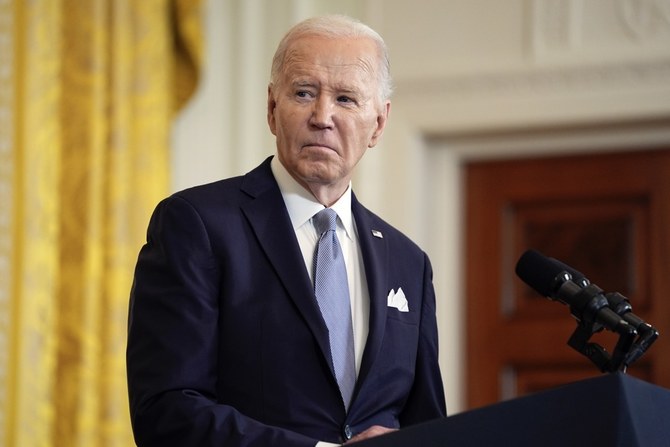
- Open letter follows calls by US senators to punish court over Netanyahu arrest warrant
- ‘The ability of the ICC to provide justice for victims requires full respect for its independence’
LONDON: More than 100 human rights and civil society organizations have called on US President Joe Biden to oppose punitive measures against the International Criminal Court.
It follows news earlier this week that the court’s prosecutor, Karim Khan, is seeking arrest warrants against Israeli Prime Minister Benjamin Netanyahu and Defense Minister Yoav Gallant, as well as three Hamas leaders.
Khan’s move was condemned by some members of the US Congress and Senate, who threatened retaliation against the ICC, including sanctions and travel bans on officers of the court.
In an open letter published on Thursday, the 121 human rights and civil society groups urged Biden to resist calls to punish the ICC.
Major human rights organizations signed the letter, including Amnesty International and Human Rights Watch.
Biden should “oppose any legislative efforts to undermine the ICC,” and “make clear that regardless of its views on specific ICC investigations, the US continues to support independent international justice mechanisms,” the letter says.
“Accountability is important for its own sake and protects against the commission of future atrocity crimes,” it added.
“The ability of the ICC to provide justice for victims requires full respect for its independence. A selective approach to judicial decisions undermines the credibility, and ultimately, the force of the law as a shield against human rights violations and abuses.”
The US is not a member of the ICC, but both Republican and Democratic administrations have supported actions taken by the court on several occasions, including by assisting in the arrests of wanted suspects.
The Biden administration has publicly welcomed ICC statements on the conflicts in Ukraine and Sudan.
Group of graduates walk out of Harvard commencement chanting ‘Free, free Palestine’

- Student speaker Shruthi Kumar said “this semester our freedom of speech and our expressions of solidarity became punishable,” she said to cheers and applause
- “I am deeply disappointed by the intolerance for freedom of speech and the right to civil disobedience on campus”
CAMBRIDGE: A group of graduates walked out of the Harvard commencement chanting “Free, Free Palestine” after weeks of protests on campus.
School officials announced Wednesday, the day before Thursday’s graduation, that 13 Harvard students who participated in a protest encampment would not be able to receive degrees alongside their classmates.
Some students chanted “Let them walk, let them walk walk,” during Thursday’s commencement, referring to allowing those 13 students to get their degrees along with fellow graduates.
Harvard University held its commencement address Thursday following a weekslong pro-Palestinian encampment that shut down Harvard Yard to all but those with university ties and roiled tensions on the campus.
Those tensions were ticked up a notch on Wednesday when school officials announced that 13 Harvard students who participated in the encampment won’t be able to receive degrees alongside their classmates. Some students chanted “Let them walk, Let them walk,” during commencement.
Student speaker Shruthi Kumar said “this semester our freedom of speech and our expressions of solidarity became punishable,” she said to cheers and applause.
She said she had to take a moment to recognize “the 13 undergraduates in the class of 2024 who will not graduate today,” Kumar said to prolonged cheers and clapping. “I am deeply disappointed by the intolerance for freedom of speech and the right to civil disobedience on campus.”
Over 1,500 students had petitioned, and nearly 500 staff and faculty had spoken up, all over the sanctions, she said.
“This is about civil rights and upholding democratic principals,” she said. “The students had spoken. The faculty had spoken. Harvard do you hear us?”
Those in the encampment had called for a ceasefire in Gaza and for Harvard to divest from companies that support the war.
Also on Thursday, the leaders of Northwestern University and Rutgers University are expected to testify at a House Committee on Education and the Workforce hearing about concessions they gave to pro-Palestinian protesters to end demonstrations on their campus. The chancellor of the University of California, Los Angeles, also was scheduled to appear at the latest in a series of hearings looking into how colleges have responded to the protests and allegations of antisemitism
The decision by the school’s top governing board follows a recommendation Monday by faculty members to allow the 13 to receive their degrees despite their participation in the encampment.
Harvard’s governing board, the Harvard Corporation, however said that each of 13 have been found to have violated the university’s policies by their conduct during the encampment protest.
“In coming to this determination, we note that the express provisions of the Harvard College Student Handbook state that students who are not in good standing are not eligible for degrees,” the corporation said in a written statement.
The statement left open the possibility of an appeals process saying the corporation understands “that the inability to graduate is consequential for students and their families” and supports the Faculty of Arts and Sciences’ intention to provide an expedited review of requests for appeal.
“We care deeply about every member of our community — students, faculty, staff, researchers, and alumni — and we have chosen a path forward that accords with our responsibilities and reaffirms a process for our students to receive prompt and fair review,” the statement added.
Supporters of the students said the decision not to allow them to receive degrees at commencement violated a May 14 agreement between interim President Alan Garber and the Harvard Out of Occupied Palestine coalition that would have allowed the students to graduate.
Protesters against the war between Israel and Hamas voluntarily dismantled their tents after they said university officials agreed to discuss their questions about the endowment, bringing a peaceful end to the kinds of demonstrations that were broken up by police on other campuses.
The group issued a statement late Wednesday saying the decision jeopardizes the post-graduation lives of the 13 students.
“By rejecting a democratic faculty vote, the Corporation has proved itself to be a wholly illegitimate body, and Garber an illegitimate president, accountable to no one at the university,” the group said.
“Today’s actions have plunged the university even further into a crisis of legitimacy and governance, which will have major repercussions for Harvard in the coming months and years,” the group said,
There was a noticeable presence of police officers around the campus Thursday mixing with soon-to-be-graduates, their family members and sidewalk flower sellers.
A small plane circled above trailing an Israeli and US flag. A truck was parked outside the campus with an electronic billboard with the names and images of some of the pro-Palestinian protesters under the banner “Harvard’s Leading Antisemites.”
At Drexel University in Philadelphia, protesters packed up their belongings and left a pro-Palestinian encampment Thursday after the school announced a decision to have police clear the encampment. A wave of pro-Palestinian tent encampments on campuses has led to over 3,000 arrests nationwide.
Russia says main power line to Zaporizhzhia nuclear plant goes down, no safety threats
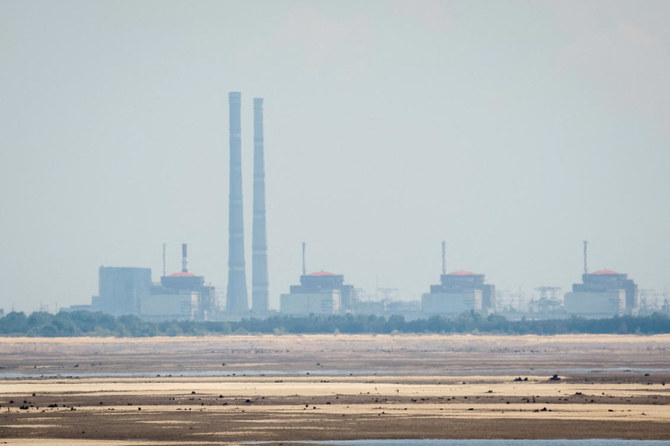
- The reasons for the outage, which had not caused any change in the radiation level, were being investigated
- The main 750 kilovolt (kV) “Dniprovska” power line went down at 13.31 local
MOSCOW: Russia said on Thursday that the main power line supplying the Russian-controlled Zaporizhzhia nuclear power plant (ZNPP) in Ukraine had gone down, but that there was no threat to safety and the plant was being supplied via a backup line.
The six reactors at the Zaporizhzhia plant, held by Russia and located close to the front line of the conflict in Ukraine, are not in operation but it relies on external power to keep its nuclear material cool and prevent a catastrophic accident.
The Russian management said on their official channel on the Telegram app that the reasons for the outage, which had not caused any change in the radiation level, were being investigated.
It said the main 750 kilovolt (kV) “Dniprovska” power line went down at 13.31 local (1031 GMT), while the 330 kV “Ferosplavnaya” line was supplying power to the plant now.
The main “Dniprovska” power line also went down for almost five hours on March 22, highlighting what the International Atomic Energy Agency (IAEA) said were “ever present dangers to nuclear safety and security” from the Russia-Ukraine war.
Russia and Ukraine have each accused the other at various times of shelling the Zaporizhzhia plant, which is Europe’s largest.
IAEA has said that the ZNPP has been experiencing major off-site power problems since the conflict began in early 2022, exacerbating the nuclear safety and security risks facing the site.
US will announce $275 million more in artillery and ammunition for Ukraine, officials say
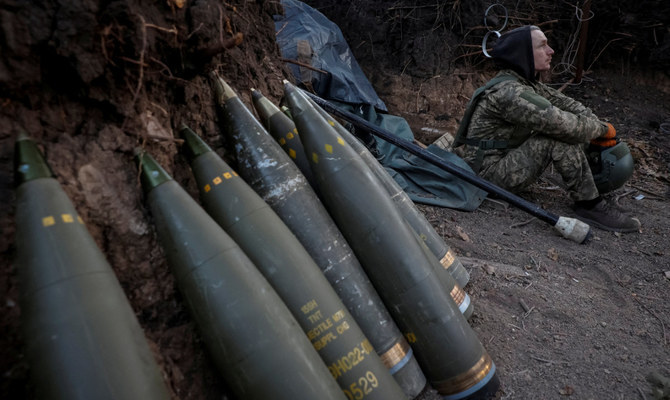
- This will be the fourth installment of military aid for Ukraine since Congress passed a long-delayed foreign aid bill late last month
- Russia has sought to take advantage of Ukrainian shortages in manpower and weapons while the war-torn country waits for the arrival of more US assistance
WASHINGTON: The United States is expected to announce an additional $275 million in military aid for Ukraine on Friday as Kyiv struggles to hold off advances by Russian troops in the Kharkiv region, two US officials say.
This will be the fourth installment of military aid for Ukraine since Congress passed a long-delayed foreign aid bill late last month and comes as the Biden administration has pledged to keep weapons flowing regularly and to get them to the front lines as quickly as possible.
The package includes high mobility artillery rocket systems, or HIMARS, as well 155 mm and 105 mm high-demand artillery rounds, according to the two US officials. They spoke on the condition of anonymity to provide details of the aid package before the public announcement.
It follows a monthly gathering Monday of about 50 defense leaders from Europe and elsewhere who meet regularly to coordinate getting more military aid to Ukraine. At this latest meeting, Defense Secretary Lloyd Austin said Ukraine was in a “moment of challenge” due to Russia’s new onslaught on Kharkiv, Ukraine’s second-largest city. He pledged to keep weapons moving “week after week.”
Russia has sought to take advantage of Ukrainian shortages in manpower and weapons while the war-torn country waits for the arrival of more US assistance, which was delayed for months in Congress. Ukrainian forces have been pushed backward in places, while Russia has pounded its power grid and civilian areas.
In the month since President Joe Biden signed the $95 billion foreign aid package, which included about $61 billion for Ukraine, the US has announced and started to send almost $1.7 billion in weapons pulled from Pentagon stockpiles.
It’s also announced $6 billion in funding through the Ukraine Security Assistance Initiative. That pays for longer-term contracts with the defense industry and means that the weapons could take many months or years to arrive.
With this latest package, the US has now provided almost $51 billion in military assistance to Ukraine since Russia invaded in February 2022.





